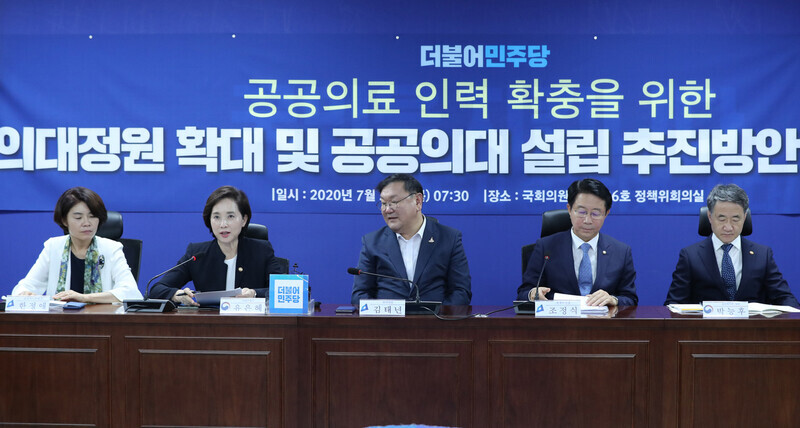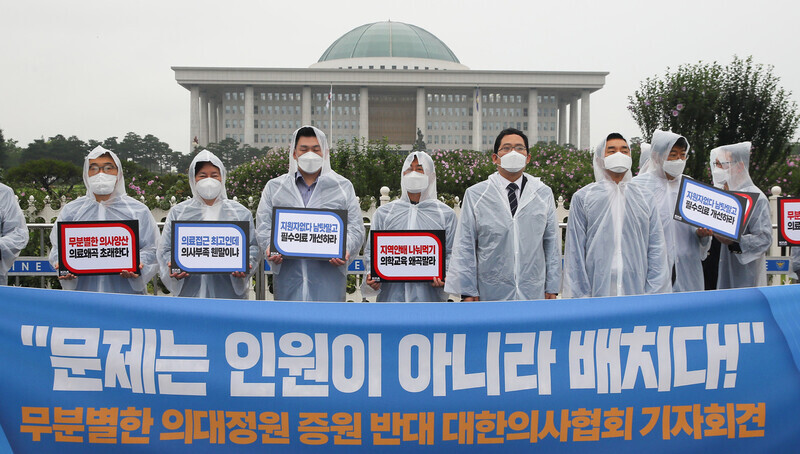hankyoreh
Links to other country sites 다른 나라 사이트 링크
[Editorial] Doctors need to call off strikes and work to strengthen nation’s healthcare infrastructure

Today marks the eve of a strike notice given on Aug. 7 by the Korean Intern Resident Association (KIRA) to protest the South Korean government’s plans to increase the cap on medical college admissions by 4,000 students over a 10-year period from 2022. The Korea Medical Association (KMA) has also announced plans for a general strike on Aug. 14. In a message on Aug. 5, the Ministry of Health and Welfare (MOHW) dismissed the demands of physician groups, stressing that the “physician shortage issue is an urgent concern that cannot be put off any longer.”
At the same time, it also said it would conform to the KMA’s request to form a “public health and medicine development plan consultative group.” The KMA is going too far, however, in insisting that the admission cap plan be retracted before the consultative group is put together. The government, for its part, must prepare thoroughly to ensure that the public’s health rights are not endangered by the healthcare workers’ strike amid the novel coronavirus pandemic, and take stern measures if any actual damages do occur.
With six out of 10 South Koreans favoring the increased medical college admission caps, physicians will be hard pressed to win their support if they do proceed with a strike that holds the public’s health hostage. Not only is the number of physicians in South Korea far below the OECD average, but the proportion in regions such as North Gyeongsang Province and South Chungcheong Province stands at only around 1.5 per 1,000 residents – around half the level in Seoul. Increasing the number of healthcare professionals is an inevitable step, if only to resolve the severe regional disparities.
In which public health is being held hostage

We should also pay attention to the message coming from healthcare groups and civil society, which support the idea of increasing medical college admission caps but argue the government plan goes only halfway with its measures for improving health services in different regions. A case in point is the 10-year mandatory service period for regional physicians. Even if regional medical students are trained and given scholarships to reduce healthcare disparities among regions, a system that requires them to work for only four to five years after completing a resident or intern program is very likely to cause problems. It’s also debatable just how much the government’s idea of increasing the admission caps for established regional medical schools will really contribute to bolstering health services. Experts have suggested that a broader outline needs to be developed for different regions to establish new public medical schools and provide customized health service education. Training healthcare practitioners without reinforcing inadequate regional healthcare infrastructure will only have the effect of intensifying the already overheated competition among hospitals. The government should pay attention to the concerns of civil society and reexamine the current plan.
According to a survey of public health and medical practitioners conducted by the MOHW last year, physicians earned an average monthly income of 13.42 million won (US$11,326), or more than five times that of an ordinary worker. In outright refusing to allow an increase in healthcare workers, the physicians come across to the public like they are simply trying to protect their own interests and forsaking the public service nature of medicine. Hopefully, the physician groups will call off their unjustified strikes and join forces with the government in devising ways of strengthening health services.
Please direct comments or questions to [english@hani.co.kr]

Editorial・opinion
![[Column] When ‘fairness’ means hate and violence [Column] When ‘fairness’ means hate and violence](https://flexible.img.hani.co.kr/flexible/normal/500/300/imgdb/original/2024/0516/7417158465908824.jpg) [Column] When ‘fairness’ means hate and violence
[Column] When ‘fairness’ means hate and violence![[Editorial] Yoon must stop abusing authority to shield himself from investigation [Editorial] Yoon must stop abusing authority to shield himself from investigation](https://flexible.img.hani.co.kr/flexible/normal/500/300/imgdb/original/2024/0516/4417158464854198.jpg) [Editorial] Yoon must stop abusing authority to shield himself from investigation
[Editorial] Yoon must stop abusing authority to shield himself from investigation- [Column] US troop withdrawal from Korea could be the Acheson Line all over
- [Column] How to win back readers who’ve turned to YouTube for news
- [Column] Welcome to the president’s pity party
- [Editorial] Korea must respond firmly to Japan’s attempt to usurp Line
- [Editorial] Transfers of prosecutors investigating Korea’s first lady send chilling message
- [Column] Will Seoul’s ties with Moscow really recover on their own?
- [Column] Samsung’s ‘lost decade’ and Lee Jae-yong’s mismatched chopsticks
- [Correspondent’s column] The real reason the US is worried about Chinese ‘overcapacity’
Most viewed articles
- 1China calls US tariffs ‘madness,’ warns of full-on trade conflict
- 2[Column] US troop withdrawal from Korea could be the Acheson Line all over
- 3[Editorial] Yoon must stop abusing authority to shield himself from investigation
- 4[Column] When ‘fairness’ means hate and violence
- 5[Column] How to win back readers who’ve turned to YouTube for news
- 6US has always pulled troops from Korea unilaterally — is Yoon prepared for it to happen again?
- 7[Book review] Who said Asians can’t make some good trouble?
- 8Naver’s union calls for action from government over possible Japanese buyout of Line
- 9Could Korea’s Naver lose control of Line to Japan?
- 10[Editorial] Korea must respond firmly to Japan’s attempt to usurp Line